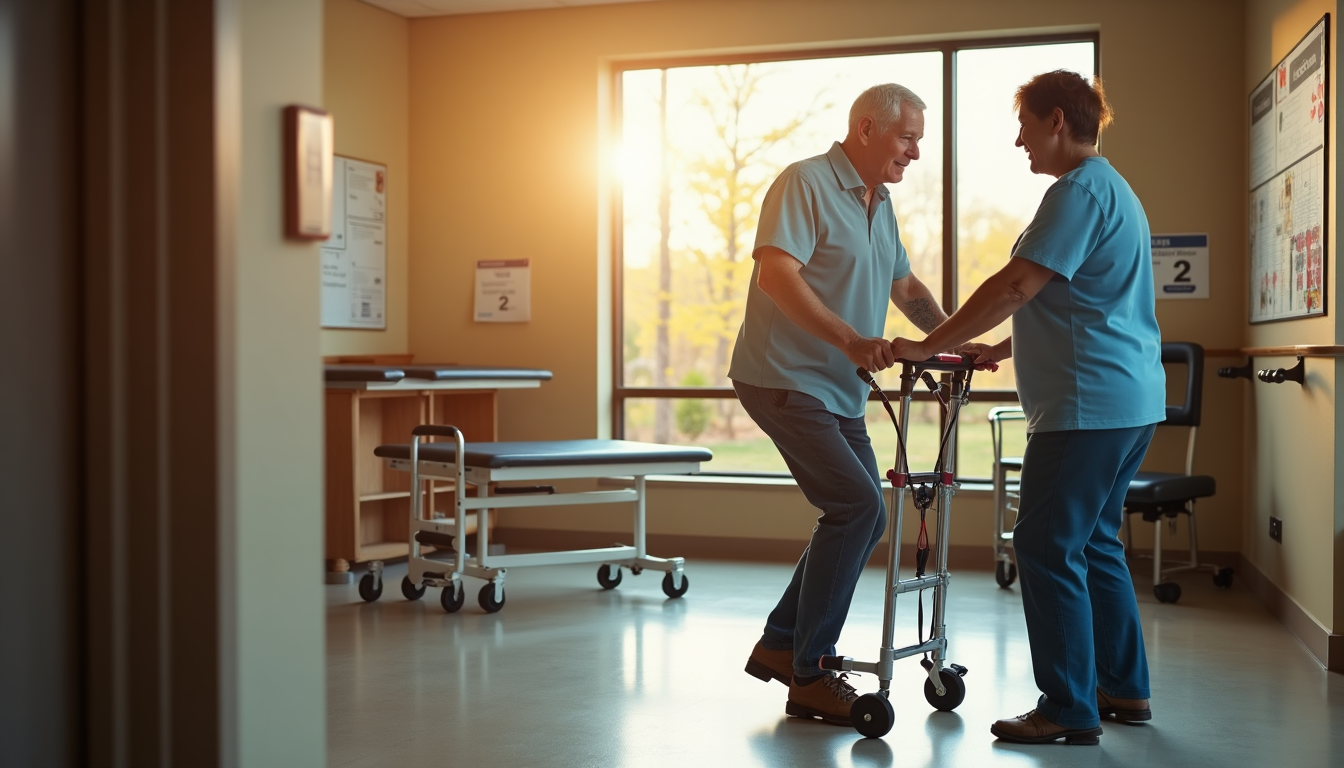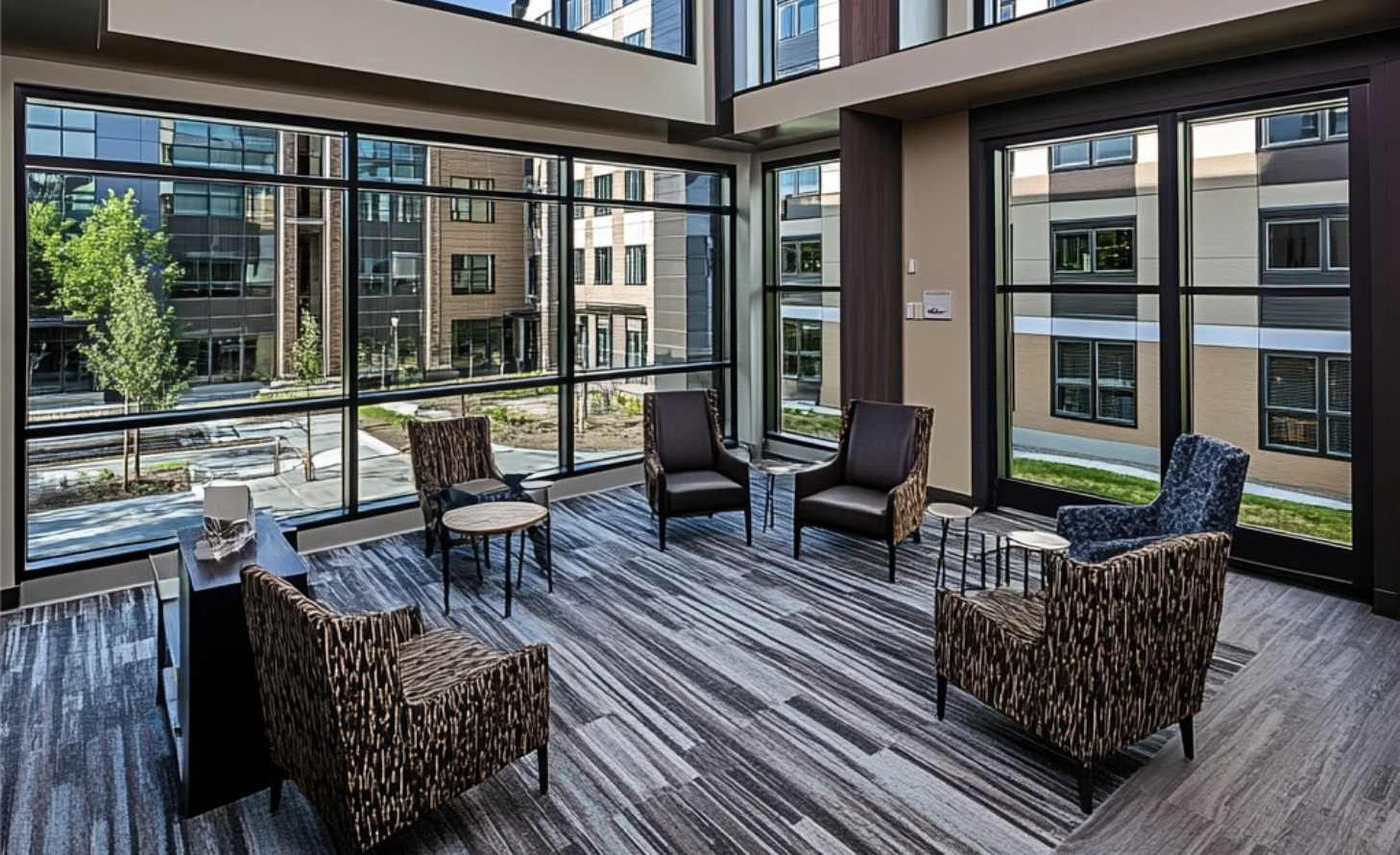Orchard Hill Rehabilitation and Healthcare Center reports a 59.9% rate of residents returning home after rehabilitation stays, surpassing Maryland’s 52.7% and the national average of 50.4%. The Towson facility maintains these outcomes despite holding a 2-out-of-5-star Medicare rating.
The 139-bed nursing home provides 3 hours and 31 minutes of daily nurse staffing per resident, falling below state and national benchmarks. Data shows 9.7% of short-term rehabilitation stays at Orchard Hill result in serious infections requiring hospitalization, exceeding both state and national averages.
Federal records reveal significant gaps between the facility’s rehabilitation success rates and its daily operations. The nursing home’s size ranks among Towson’s largest, yet staffing levels remain consistently below recommended standards.
This investigation examines daily operations at Orchard Hill Rehab beyond official Medicare metrics. The review analyzes staffing patterns, rehabilitation outcomes, and quality measures to evaluate the facility’s performance against state and national standards.
Understanding Orchard Hill’s Medicare Ratings
Orchard Hill Rehabilitation and Healthcare Center holds a 1-out-of-5 star overall rating from the Centers for Medicare & Medicaid Services (CMS). The rating falls significantly below Maryland’s 3.42 and the national 3.32 star averages.
Breaking Down the Rating Components
Federal evaluations show consistently low performance across key metrics:
- Health Inspections: 1 star
- Staffing Levels: 1 star
- Quality Measures: 3 stars
The facility’s nurse staffing numbers reveal serious shortfalls. Daily nursing care averages 3 hours and 31 minutes per resident, missing Maryland’s benchmark of 3 hours and 48 minutes. Physical therapy services amount to 20 minutes weekly per resident.
What the Numbers Actually Mean
Quality measures data shows mixed performance. The facility maintains independence for 74.6% of residents in daily activities, though this lags behind Maryland’s 79.3% and the national rate of 85.9%.
Recent penalties highlight oversight concerns. The facility paid two fines – $658 in March 2022 and $3,250 in June 2021, contributing to its 1-star health inspection rating.
Recent Rating Changes and Trends
Short-term rehabilitation maintains “Average” (2/3) performance, driven by a 59.9% home discharge rate exceeding state and national levels.
Long-term care remains “Below Average” (1/3). Data shows 9.7% of short-term stays lead to serious infections requiring hospitalization, surpassing Maryland’s 7.1% and the national 7.0% rates.
CMS updated its rating system in January 2023, adjusting quality measures based on schizophrenia coding accuracy. The Nursing Home Care Compare website now displays disputed citations, increasing transparency into facility performance.
The Reality Behind Orchard Hill Rehab Reviews
Patient testimonials and official reviews reveal stark contrasts in experiences at Orchard Hill Rehabilitation and Healthcare Center patient testimonials.
Analysis of Patient Feedback Patterns
Recent feedback documents significant changes following the facility’s USD 3.50 million renovation. Short-term rehabilitation patients report notably better experiences than long-term residents. The facility’s USD 658.00 fine history corresponds with negative feedback trends, particularly regarding staffing levels.
Common Praise Points
Patient reviews consistently highlight the rehabilitation department’s performance. Key strengths include:
- Physical therapy team expertise and motivation methods
- Staff response times in rehabilitation units
- Facility cleanliness after renovation
- Convenient on-site dialysis services
Patient records show substantial progress in mobility and independence. Multiple residents advanced from requiring full assistance to achieving independent movement.
Recurring Complaints and Concerns
Federal records show one certified nursing assistant often manages up to 35 residents, leading to documented care deficiencies. Patients report significant delays in receiving basic assistance, though response times vary between departments. The rehabilitation unit maintains higher satisfaction rates than long-term care areas.
Supply management issues plague daily operations. Staff regularly report difficulties accessing essential items like clean linens. Department communication gaps affect care coordination.
Weekend staffing levels match weekday numbers, yet service quality fluctuates between shifts. Short-term residents face an 8.9% emergency room visit rate, suggesting gaps in preventive care.
Marketing materials promise “a whole new level of post acute care”, but patient experiences indicate uneven service delivery across departments and work shifts.
Rehabilitation Services Deep Dive
Orchard Hill’s USD 3.50 million renovation brought expanded therapy options and new equipment to its rehabilitation wing. The upgrades mark significant changes in the facility’s treatment capabilities.
Physical Therapy Program Assessment
Physical therapy services run seven days weekly, specializing in post-operative care and joint replacement recovery. The facility’s physiatry-driven programs target specific recovery paths:
- Cardiac recovery support
- Neurological rehabilitation
- Pulmonary care programs
- Joint replacement therapy
- Stroke recovery services
Patient records show measurable mobility improvements. Former patient Randy Lynn progressed from needing full assistance to independent walking.
Occupational Therapy Offerings
The facility’s Family Matters Program coordinates patient care through virtual navigation meetings and remote home evaluations. Occupational therapists combine traditional hands-on methods with Life Loop technology, allowing families to track rehabilitation progress.
Discharge support extends beyond facility walls. Patients receive complimentary meals during their first two days home, plus coordinated post-discharge resources. These services aim to smooth the transition to independent living.
Success Rate Analysis
Rehabilitation outcomes show mixed results. The facility’s 59.9% home discharge rate beats Maryland’s 52.7% and the national 50.4% average. Federal data reveals additional metrics:
Major injury falls affect 1.0% of residents. Short-term rehabilitation stays lead to serious infections requiring hospitalization in 9.7% of cases, surpassing Maryland’s 7.1% average.
Patient testimonials document significant progress. Robert Ahlfeldt achieved “500% improvement” in leg and upper body function. Keith Spann advanced from complete immobility to independence within two months.
Emergency room visits occur in 8.9% of short-term stays, beating the 11.9% national rate but suggesting room for improvement. These outcomes emerge despite providing 3 hours and 31 minutes of daily nurse staffing per resident, below state averages.
Staffing and Care Quality Investigation
Federal records show critical staffing shortfalls at Orchard Hill Rehabilitation and Healthcare Center. The facility delivers 3.48 nurse hours per resident daily, missing Maryland’s 3.9-hour average.
Staff-to-Patient Ratios
One certified nursing assistant manages up to 35 residents at Orchard Hill. This ratio violates proposed federal guidelines requiring 2.45 hours of daily certified nursing assistant care per resident.
Weekend staffing matches weekday levels. The numbers mask deeper problems – 15% of nursing staff each week represent new hires due to constant turnover.
Staff Turnover Impact
Orchard Hill’s 64.8% nurse turnover rate towers above Maryland’s 44.3% average. This revolving door creates serious problems:
- Broken care continuity
- Missing personalized care
- Higher resident safety risks
- Declining daily care quality
Research links turnover rates above 50% to 1.5 times more resident abuse cases. Orchard Hill’s staff churn corresponds with rising infection violations and hospital readmissions.
Quality Measures vs. Daily Reality
Federal inspectors cited the facility for failing to maintain adequate nursing staff. These shortages manifest in measurable harm:
Emergency department visits reach 2.0 per 1000 patient days, doubling Maryland’s average of 1.0 and exceeding the national 1.4 rate. Citations document failures in basic care – eating assistance, hygiene help, and maintaining resident wellbeing.
Staffing gaps compromise specialized care delivery. Records show repeated failures following treatment plans and resident preferences. Vision and hearing services suffer particular neglect under current staffing patterns.
Facility Infrastructure and Resources
Orchard Hill Rehabilitation and Healthcare Center’s USD 3.50 million renovation transformed its physical space, though daily operations show persistent challenges.
Equipment and Technology Assessment
The facility’s new 2,500-square-foot therapy gym anchors recent upgrades. Modern equipment includes a smart car for mobility training. The Activities of Daily Living (ADL) suite replicates home settings for discharge preparation.
Current specialized equipment includes:
- DaVita partnership hemodialysis systems
- Physical therapy and rehabilitation tools
- Smart patient monitoring technology
- Life Loop family communication platform
Building Maintenance Issues
Federal inspectors cited the facility for hazardous conditions. Staff reports reveal chronic supply shortages, particularly clean linens and basic care items. Health department records show food storage and preparation violations.
Wide hallways and glass partitions flood spaces with natural light. Despite modern renovations, maintenance problems persist. Inspection records document waste management failures and unsanitary floor conditions.
Amenity Availability and Access
Operating hours run 9:00 AM to 4:00 PM Monday through Friday. Landscaped courtyards provide outdoor spaces.
The 134-bed facility features modern furnishings. Handicap accessibility extends throughout the building. Dining services offer menu variety, though residents report inconsistent food quality and meal assistance.
Common areas include TV lounges, WiFi access, and cable service. Additional amenities feature housekeeping, laundry facilities, and beauty services. Religious programs and local outings support resident social needs.
Federal records show service quality fluctuations across amenities. Staff training addresses cultural competency, yet personnel shortages affect service delivery.
Making an Informed Decision
Federal data reveals critical evaluation points for rehabilitation facility selection. Orchard Hill Rehabilitation and Healthcare Center’s performance metrics highlight key considerations for prospective residents.
Red Flags to Watch For
Emergency department visits at Orchard Hill reach 2.0 per 1000 patient days, suggesting gaps in preventive care. Current staffing ratios show one certified nursing assistant managing up to 35 residents, leading to documented care delays.
Critical warning signs include:
- Unclear staff credential documentation
- Rushed admission processes
- Ambiguous financial terms
Questions to Ask During Tour
Patient records and federal citations point to specific areas requiring scrutiny:
- Weekend and holiday staffing levels
- Rehabilitation program success metrics
- Emergency transfer protocols
- Dietary services
- Fall prevention systems
The Joint Commission and CARF certifications provide quality benchmarks. Request detailed information about:
- Physical therapy scheduling
- Occupational therapy access
- Speech therapy programs
- Post-discharge support
- Family participation protocols
Alternative Options in Towson
Maryland Addiction Recovery Center (MARC) provides comprehensive services:
- Residential treatment
- Outpatient programs
- Individual therapy
- Group sessions
- Family support
- Holistic care
Towson Rehabilitation and Healthcare Center maintains High Performing status in short-term rehabilitation. Their 132-bed facility reports:
- 61.5% home discharge rate
- 1.3% fall incidence
- Stable weekend staffing
Chase Brexton Health Care and Maryland Addiction Recovery Center offer specialized programs. Alternatives to Dependency features:
- Outpatient therapy options
- Gender-specific programs
- Age-targeted care
- Addiction recovery services
The urban location provides medical resource access. Military insurance coverage supports veteran-focused treatment programs.
Conclusion
Orchard Hill Rehabilitation and Healthcare Center’s performance data reveals stark contrasts. The facility’s 59.9% home discharge rate surpasses state and national averages. Recent USD 3.5 million renovations upgraded physical therapy equipment and spaces.
Federal records show critical staffing deficiencies. One certified nursing assistant manages up to 35 residents, compromising care delivery. Emergency department visits reach 2.0 per 1000 patient days, exceeding state benchmarks and indicating preventive care gaps.
Patient outcomes data suggests Orchard Hill suits short-term rehabilitation needs better than long-term care requirements. The facility’s documented staff turnover and care oversight issues demand careful evaluation. Towson’s rehabilitation market offers multiple alternatives, particularly for extended care needs.
FAQs
Q1. What is the overall Medicare rating for Orchard Hill Rehabilitation and Healthcare Center? Orchard Hill currently holds a 1-out-of-5 star overall rating from the Centers for Medicare & Medicaid Services (CMS), which is below both Maryland’s and the national average.
Q2. How successful is Orchard Hill’s rehabilitation program? The facility has a 59.9% success rate in returning residents home after rehabilitation, which is higher than both state and national averages. However, 9.7% of short-term rehabilitation stays result in serious infections requiring hospitalization.
Q3. What are the staffing levels like at Orchard Hill? Orchard Hill provides 3 hours and 31 minutes of nursing care per resident daily, which falls short of Maryland’s average. The facility operates with one certified nursing assistant caring for up to 35 residents, which is a concerning ratio.
Q4. Has Orchard Hill undergone any recent renovations? Yes, Orchard Hill recently completed a $3.50 million renovation, which included the construction of a new 2,500-square-foot therapy gym and the addition of modern equipment and technology.
Q5. Are there any alternatives to Orchard Hill in the Towson area? Yes, there are several alternatives in Towson, including Maryland Addiction Recovery Center (MARC), Towson Rehabilitation and Healthcare Center, Chase Brexton Health Care, and Alternatives to Dependency. These facilities offer various levels of care and specialized services.












